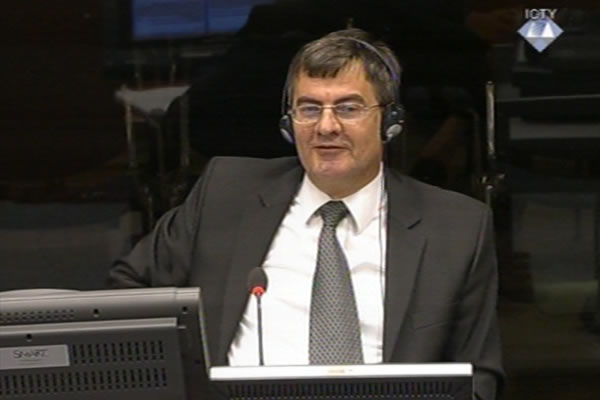Home
KARADZIC’S EXPERT: ENTIRE CITY OF SARAJEVO WAS NOT MILITARY TARGET
At the beginning of the cross-examination, Radovan Karadzic’s ballistic expert didn’t agree with the claim that the entire Sarajevo was a legitimate military target. According to the witness, only those parts of Sarajevo where troops were deployed and from which fire was opened could be considered as military targets. Nenad Kecmanovic will begin his evidence tomorrow
 Mile Poparic, defence witness of Radovan Karadzic
Mile Poparic, defence witness of Radovan Karadzic As his evidence at the request of Radovan Karadzic’s defense continues, ballistic expert Mile Poparic denied that the Sarajevo-Romanija Corps was responsible for the sniper attacks on the citizens of Sarajevo. Poparic repeated the arguments he first mooted yesterday about the blocked lines of vision for the Serb snipers and the lack of forensic and medical documentation. Today the witness claimed that in several situations sniper fire was opened on civilians in the city from the territory under the BH Army control.
The prosecution alleged that the sniper bullet that wounded two women in a bus on 25 May 1992 came from the direction of the Faculty of Theology building. In his comment on the incident, the witness said that the site from which the fire was opened was lower than the bus.Also, the line of vision was blocked by buildings. It was therefore ‘quite certain’ that fire was not opened from the Bosnian Serb positions.
Poparic then addressed the attacks on the passengers in the Sarajevo trams, trying to exonerate the Serb army for the attacks. It is difficult to establish the real truth without a complete medical and photo documentation, Poparic argued. However, based on the assessment of the angle of descent and the impact energy, the witness concluded that the Serb snipers didn’t fire at the trams in the incidents alleged in the indictment against Karadzic. Moreover, the witness is convinced that in some cases, snipers fired from the Executive Council building in the part of Sarajevo controlled by the BH Army.
At the beginning of the cross-examination, prosecutor Gaynor focused on the part in the report Poparic wrote together with his colleague Zorica Subotic, another ballistic expert who testified for Karadzic’s defense. Poparic and Subotic put in their report the claim of retired VJ general Radovan Radinovic, who said that ‘if BH Army units are drawn on the Sarajevo map, one can get a real picture of the city that was practically in its entirety a military target’. The witness said that the excerpt was incorporated in the report only because it spoke about the deployment of the units in the city. Poparic didn’t say that the entire city was a military target, only those parts where there were troops and from which fire was opened.
The prosecutor contested the part of Poparic’s and Subotic’s joint report in which they tried to present modified air bombs as an artillery weapon accurate enough to attack targets in residential areas. According to the prosecution, modified air bombs were extremely inaccurate, yet devastating weapon. The prosecutor put it to Poparic that it took five to seven years to develop a new weapon system and that air bombs and launchers were modified quickly, during the war. Poparic replied that in this case six months to a year were enough to introduce new technology. Air bombs ‘only had to be attached’ to the existing rocket engine and the launchers adjusted, Poparic explained. The witness remained adamant even when the prosecutor reminded him that the air bombs of different weights and with different number of engines were used and that they were launched from untested launchers.
Prosecutor Gaynor will complete his part of the cross-examination about the artillery issues tomorrow. After that, Karadzic will call former Bosnian politician Nenad Kecmanovic. Next week, prosecutor Edgerton will cross-examine Poparic about the sniper incidents.
Linked Reports
- Case : Karadzic
- 2013-05-29 KARADZIC HIDES BEHIND BUILDINGS, SHRUBBERY AND FOG
- 2013-05-28 CREATING ‘NEW DEMOGRAPHIC PICTURE’ IN REPUBLIKA SRPSKA
- 2013-05-23 INTELLIGENCE OFFICER IN ‘SOAP BUBBLE’
- 2013-05-31 NENAD KECMANOVIC – ‘PROPAGANDA VICTIM’
- 2013-06-05 KARADZIC’S BALLISTIC EXPERT COMPLETES EVIDENCE
- 2013-06-06 KARADZIC WAS “SAD” BECAUSE MUSLIMS LEFT
